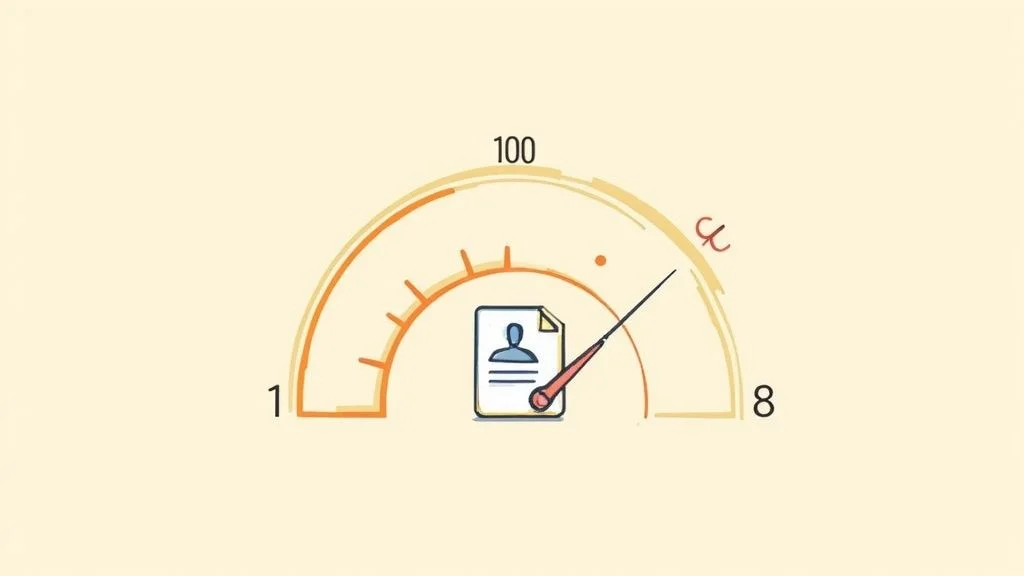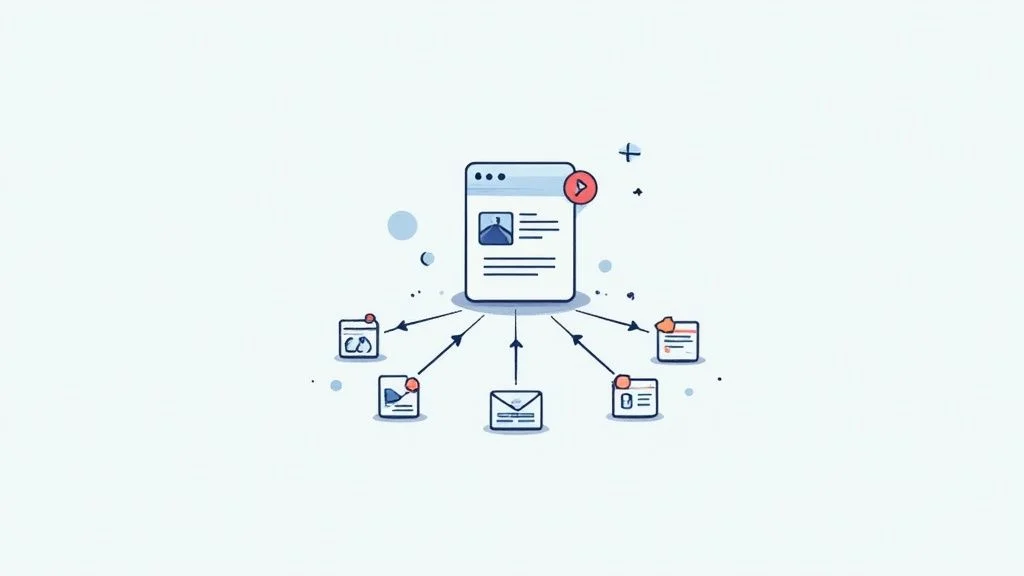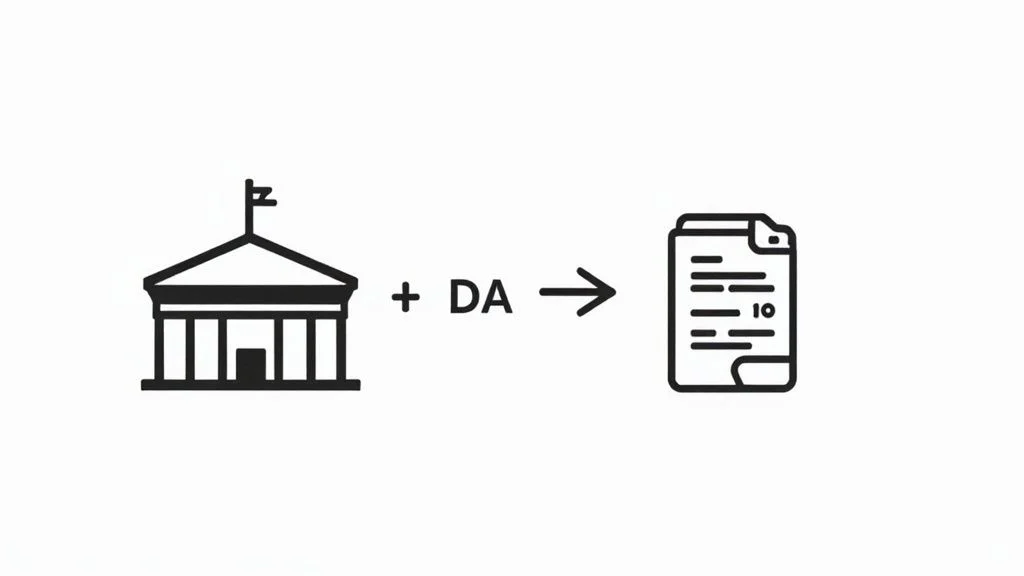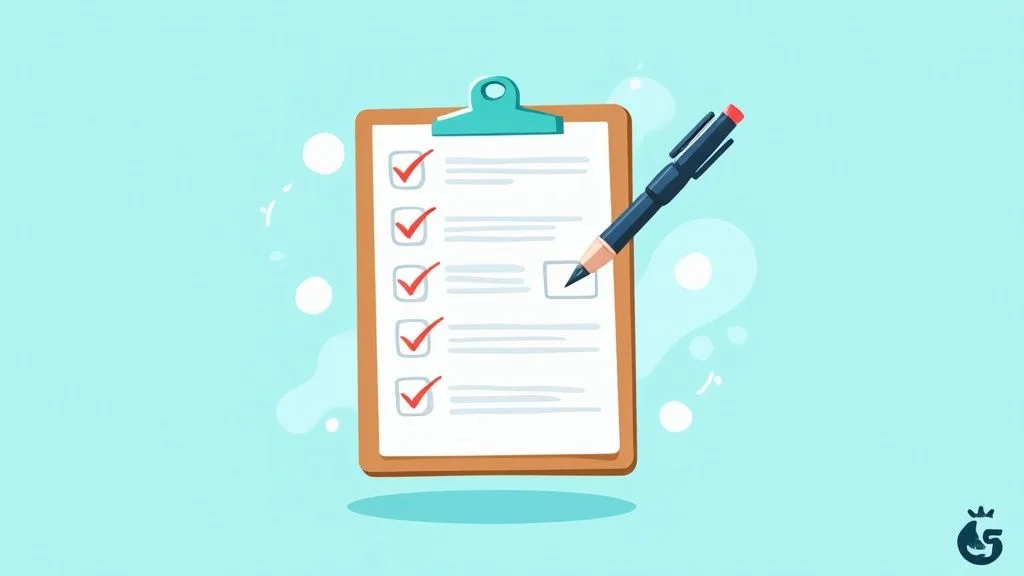
What Is Page Authority? Learn How to Boost Your Scores
Sections
- What Page Authority Looks Like in the Real World
- How the Page Authority Score Is Calculated
- Page Authority vs Domain Authority Explained
- Why Page Authority Matters to Your SEO Strategy
- Actionable Ways to Increase Your Page Authority
- Common Page Authority Myths You Should Ignore
- Got Questions About Page Authority? Let's Clear Things Up.
So, you’ve probably heard the term Page Authority, or PA, floating around. What is it, really? It’s a score created by the folks at Moz that acts like a crystal ball, predicting how well a single page on your website is likely to rank in search results. Think of it as a page’s individual street cred - the higher the score, the better its odds of landing on that coveted first page of Google.
#What Page Authority Looks Like in the Real World

Let’s use an analogy. Imagine your website is a massive library. Every book inside that library is one of your webpages. Page Authority doesn’t care about the reputation of the library as a whole. Instead, it measures the clout and influence of one specific book. A book that’s well-researched and frequently cited by other experts will naturally have a high PA. A brand-new book nobody’s read yet? It’s going to have a low score.
#Breaking Down the Score
The score itself runs on a 1-to-100 logarithmic scale. Now, “logarithmic” might sound like high-tech jargon, but the concept is simple. It’s way easier to boost your score from a 20 to a 30 than it is to make the jump from 70 to 80. Each step up the ladder gets progressively harder and demands a lot more effort. If you want to dig deeper into concepts like this, a good glossary of SEO terms is a great place to start.
It’s crucial to remember that Page Authority is not a ranking factor that Google uses directly. However, the things that influence PA - like the number and quality of backlinks pointing to that page - are exactly what Google cares about. This tight connection makes PA an indispensable metric for any serious SEO work, giving you a quick way to size up a page’s competitive strength.
Key Takeaway: Page Authority is best used as a comparative tool. Its true power comes from pitting your page’s PA against the pages that are already ranking for your target keywords. This gives you a realistic idea of the hill you have to climb.
To make it even clearer, here’s a quick rundown of what makes up Page Authority.
#Page Authority at a Glance
This table breaks down the essentials of Page Authority into bite-sized pieces.
| Attribute | Description |
|---|---|
| **Metric Focus** | Predicts the ranking potential of a *single* webpage (URL). |
| **Scoring Scale** | 1 to 100, where higher scores indicate greater ranking potential. |
| **Scale Type** | Logarithmic, meaning score improvements become harder at higher levels. |
| **Primary Influencer** | The quality and quantity of external links pointing to the page. |
At its core, Page Authority is all about understanding the “link equity” a specific page has built up over time. By keeping an eye on this score, you can make smarter decisions about where to focus your content and link-building efforts.
#How the Page Authority Score Is Calculated
So, what’s actually under the hood of a Page Authority score? While Moz uses a complex machine learning model that looks at dozens of different signals, the whole calculation really boils down to one dominant ingredient: backlinks.

The number of links pointing to your page, and far more importantly, the quality of those links, are what drive your score up or down.
Think of it like getting a job reference. You could get a dozen generic recommendations from people you barely know, or you could get one single, glowing reference from a well-respected leader in your field. Which one do you think lands you the job? SEO works the same way. A single link from a trusted, high-authority website is a powerful vote of confidence that carries immense weight.
This is why just chasing link counts is a fool’s errand. You have to focus on earning the right links.
#The Power of Link Quality and Quantity
The Page Authority algorithm is designed to mirror how search engines like Google gauge a page’s reputation online. It analyzes the entire link profile of one specific URL, rewarding pages that have earned links from credible, established, and relevant sources.
A page with just 10 links from major news outlets or top-tier industry blogs will almost always crush a page with 100 links from unknown, low-quality sites. Quality trumps quantity, every single time.
The algorithm pays close attention to a few key factors in your backlink profile:
-
Linking Domain’s Authority: A link from a site with a high Domain Authority (DA) passes more “link equity” or “link juice,” giving your page a serious boost.
-
Relevance of the Linking Site: Links from sites within your own industry are worth far more than links from random, unrelated websites.
-
Number of Unique Referring Domains: Getting links from many different websites is much more powerful than getting a bunch of links from the same one.
Key Insight: At its core, Page Authority is a measure of a single page’s earned trust across the web. The more credible sites that vouch for your page by linking to it, the higher its authority score will climb.
#Your Most Actionable Lever
While Moz keeps the exact formula under lock and key, the takeaway for us is refreshingly simple. If you want to increase a page’s PA score, you need to build a strong and healthy backlink profile for that specific page. It’s that direct.
This means your job is to create content so valuable that other people can’t help but link to it.
Every strategic move you make - from writing a guest post on a respected blog to publishing original data that earns natural citations - feeds directly into this calculation. By focusing your efforts on acquiring high-quality backlinks, you’re pulling the most powerful lever you have to improve a page’s authority.
#Page Authority vs Domain Authority Explained
It’s really common to get Page Authority (PA) and Domain Authority (DA) mixed up, but telling them apart is crucial for building a sharp SEO strategy.
Let’s try an analogy. Picture your website as a popular, well-respected bookstore. The store’s overall reputation for having an amazing selection and knowledgeable staff is its Domain Authority. This strong brand reputation means customers trust any book on its shelves.
Now, think about a single, best-selling novel featured in the front window. That’s the Page Authority. While the bookstore’s good name helps it get noticed, the book’s own popularity - its PA - comes from its individual merits, like rave reviews and how many book clubs are recommending it.
#A Tale of Two Scopes
Domain Authority is the big-picture metric. It predicts the ranking potential for your entire website and gives you a single score that reflects the overall strength of your domain (yoursite.com). This is your 30,000-foot view, perfect for sizing up your site against the competition. A high DA tells search engines that your website, as a whole, is a credible source of information.
Page Authority, on the other hand, gets way more specific. It drills down to the ranking strength of a single page, like yoursite.com/specific-blog-post. This metric is tactical because, at the end of the day, Google ranks individual pages, not whole websites. People search for answers, and those answers live on pages.
Here’s a great visual from Moz that shows how PA can differ from page to page on the same website.

As you can see, the homepage might have a high PA, while a newer blog post has a much lower one. Each page’s authority is judged on its own backlink profile and unique signals.
To make this crystal clear, let’s break down the key differences in a table.
#Page Authority vs Domain Authority: A Direct Comparison
| Feature | Page Authority (PA) | Domain Authority (DA) |
|---|---|---|
| **What It Measures** | The ranking strength of one specific page. | The ranking strength of an entire website or domain. |
| **Scope** | Micro-level and granular (e.g., a single blog post). | Macro-level and holistic (the whole domain). |
| **How It's Used** | Tactically, to assess a page's ability to rank for a keyword. | Strategically, to gauge overall site health and competitiveness. |
| **Influence** | Driven by links pointing directly to that specific page. | An aggregate score influenced by all inbound links to the domain. |
This table shows that while related, PA and DA serve distinct purposes in your SEO toolkit.
#How They Work Together
Even though they measure different things, PA and DA are closely linked. They have a symbiotic relationship where improving one often helps the other.
-
When you earn high-quality backlinks for a specific blog post, you directly increase its Page Authority.
-
As more of your individual pages gain authority, they collectively strengthen your entire domain, which in turn can help lift your Domain Authority.
A healthy website needs both. You want a trusted domain that provides a strong foundation, but you also need individual pages powerful enough to stand on their own and win competitive search rankings.
#Why Page Authority Matters to Your SEO Strategy
Alright, you get what Page Authority is and how it’s calculated. But the real question is, why should you even care? This isn’t just another vanity score to chase. Think of PA as a diagnostic lens - a powerful tool that helps you size up the competition and make smarter SEO decisions.
Seasoned SEO pros live by this metric for quick and dirty competitive analysis. Let’s say you’re targeting a new keyword. A quick scan of the PA scores for the pages on page one tells you everything you need to know about the “link strength” you’re up against. It helps you set realistic goals and figure out just how much muscle you’ll need to put behind your efforts to even stand a chance.
#Prioritizing Your Link Building Efforts
Page Authority gives you a clear roadmap for where to focus your link-building energy. Let’s be honest, not all pages on your site are created equal. You have your money-making commercial pages and your helpful, informational blog posts. By keeping an eye on the PA of each, you can spot high-value pages that are lagging behind and need a serious boost.
This data-driven approach means you can channel your resources - your time, your budget, your outreach - into strengthening the pages that actually drive business. It’s a whole lot smarter than just randomly scattering backlinks across your site and hoping for the best. On that note, building your site’s overall credibility is also a huge piece of the puzzle. You can dive deeper into this with our guide on how to build topical authority to establish your expert status on Google.
The predictive power of Page Authority makes it an indispensable tool for making smarter, data-informed SEO decisions. It helps you allocate resources where they’ll have the greatest impact on your bottom line.
#A Strong Predictor of Traffic Potential
At the end of the day, it all comes down to traffic. A higher PA score is strongly linked to better ranking potential, which means more organic visitors walking through your digital door.
And the data doesn’t lie. A 2020 analysis of thousands of commercial pages found that pages with a PA of 40 or higher sucked in over 75% of the organic search traffic for their keywords. Meanwhile, pages with a PA below 20 barely got a look in, accounting for less than 5%.
This just goes to show that improving your PA isn’t about climbing some third-party scoreboard. It’s about positioning your content to win a much bigger slice of the traffic pie. To give your entire site a lift and pull in even more visitors, it’s also worth implementing a solid set of ecommerce SEO best practices.
#Actionable Ways to Increase Your Page Authority

Alright, so you get what Page Authority is. Now for the fun part: actually making it go up. Let’s be clear, improving your PA isn’t about finding some secret hack. It’s about consistently doing the right things over time to build a page’s reputation from the ground up.
And where does that process start? It always begins with creating something that’s genuinely worth linking to.
The absolute foundation of any PA strategy is truly link-worthy content. We’re talking about pages that are so incredibly useful, insightful, or unique that other creators in your space feel almost obligated to cite them. Think original research reports, incredibly detailed “how-to” guides, or free tools that actually solve a problem for people.
Once you’ve built that amazing asset, you can get proactive and start earning the high-quality backlinks that will really get the needle moving.
#Earn High-Quality Backlinks
Backlinks are the rocket fuel for Page Authority. But here’s the catch: not all links are created equal. Your mission is to earn “votes of confidence” from other reputable, relevant websites in your industry. A single link from a well-respected source is worth more than a hundred links from spammy, low-quality sites.
Here are a few battle-tested ways to earn links that really count:
-
Strategic Guest Blogging: Don’t just spray and pray. Pinpoint the authoritative blogs that your ideal audience actually reads. When you contribute a genuinely valuable article, the backlink you get is contextual, relevant, and carries some serious weight.
-
Broken Link Building: This is a classic win-win tactic. Use an SEO tool to hunt for broken links on other relevant websites - links that used to point to content similar to yours. You then reach out to the site owner, give them a friendly heads-up about their dead link, and suggest your working page as the perfect replacement. You’re helping them, and they’re helping you.
-
Digital PR and Outreach: If you’ve created something with compelling data, a unique story, or an expert take, it’s time for a little digital PR. Get that content in front of journalists and industry bloggers. Earning a mention or a link from a news outlet or a top-tier publication can give your page a massive authority boost.
#Master Your Internal Linking
While links from other sites are the most powerful driver of PA, you can’t afford to ignore your internal linking. Think about it: your own website has authority, and you can strategically channel that “link equity” from your strongest pages to the ones that need a lift.
For example, if your homepage has a high PA, a simple link from it to a new blog post passes along some of that strength. It’s like giving your new content a little head start. This not only helps search engines discover your new pages faster but gives them an initial authority bump.
Building a solid internal linking structure helps spread authority all across your site. If you want to dive deeper, you can explore how to build a powerful internal linking strategy in our detailed guide.
Key Insight: Think of your website like a power grid. A strong internal linking structure ensures that authority doesn’t just pool on a few top pages but flows efficiently to every important page, lifting the entire site’s visibility.
When you systematically create amazing content, earn quality links from other sites, and distribute authority with smart internal linking, you create a powerful flywheel. Each action feeds the next, steadily increasing your Page Authority and, ultimately, your ability to rank for the keywords that actually matter to your business.
#Common Page Authority Myths You Should Ignore
It’s easy to get bad advice about Page Authority. Chasing the wrong ideas can send your SEO strategy spinning in circles, so it’s time to separate the facts from the fiction. Let’s bust a few of the most common myths that can lead you down the wrong path.
The biggest one by far is that PA is a direct Google ranking factor. It’s not. Google has its own incredibly complex algorithm and doesn’t look at Moz’s Page Authority score at all. Think of PA as a highly accurate predictor. It’s built on the same ingredients Google cares about - like high-quality backlinks - so it gives you a solid clue about how a page might perform.
#Can You Buy a High PA Score Overnight?
Another persistent myth is that you can just buy your way to a high Page Authority score. While you can certainly purchase backlinks, real authority is never for sale. If you see a sudden, massive jump in your PA, that’s a huge red flag. It almost always points to sketchy, low-quality links that will do more harm than good and could even get you penalized by search engines.
A strong Page Authority score is earned, not bought. It’s the byproduct of a sustained effort to create exceptional content and build genuine relationships that result in natural, high-quality backlinks over time.
Real growth is a slow burn. It comes from earning trust and respect in your niche, and that takes patience and consistent work. There are no shortcuts.
#Is PA the Only Metric That Matters?
Finally, it’s easy to fall into the trap of thinking Page Authority is the one and only SEO metric that counts. This is a dangerously narrow perspective. While PA is a fantastic tool for sizing up your competition and tracking your link-building progress, it’s just one piece of a much bigger puzzle.
A winning SEO strategy has to look at the whole picture, including things like:
-
Content Quality: How well does your content actually solve the searcher’s problem?
-
On-Page SEO: Are your title tags, meta descriptions, and headers all dialed in?
-
User Experience: Is your site fast, mobile-friendly, and a breeze to navigate?
-
Topical Authority: Does your site thoroughly cover a subject, positioning you as an expert?
Obsessing over Page Authority alone means you’re ignoring other signals that are just as critical for ranking. The best approach is holistic. Use PA as a guide for your link-building, but make sure every other part of your SEO is firing on all cylinders, too.
#Got Questions About Page Authority? Let’s Clear Things Up.
Alright, let’s wrap this up by tackling a few of the most common questions that always seem to pop up. Think of this as a quick debrief to clear away any final bits of confusion before you start putting all this into action.
#What Is a Good Page Authority Score?
This is the million-dollar question, and the answer is probably simpler than you think: a “good” score is always relative.
Seriously, there’s no magic number that means you’ve “made it.” Chasing an arbitrary score like 50 or 60 is a waste of energy. Instead, your focus should be squarely on your direct competition. Your real goal is to have a Page Authority that’s in the same league as - or even better than - the pages already ranking for the keywords you want.
So, if the top results for your target keyword all have a PA around 35, then guess what? That’s your target.
#How Long Does It Take to Improve My PA?
Improving your Page Authority is a marathon, not a sprint. You won’t see big jumps overnight, and that’s because it’s so heavily tied to earning genuine backlinks from other websites. That kind of trust-building just takes time.
Building authority is a long-term investment. You should expect to see slow, steady improvements over months of consistent, high-quality work. If you see a massive, quick spike, it’s often a red flag for spammy tactics that can come back to bite you.
A realistic timeline? Give it at least 6-12 months of dedicated effort to see meaningful, lasting growth.
#Can My PA Go Up Without New Backlinks?
While fresh external backlinks pack the biggest punch, you’re not completely powerless without them. Your best move here is to lean on a strong internal linking strategy.
When you link from your own high-authority pages (like your homepage) to a newer, weaker page, you’re essentially passing some of that “link equity” down the line. It’s a small boost, but it’s a helpful one.
Another thing you can do is clean house. Removing toxic or spammy links pointing to your page can sometimes have a positive effect by tidying up your overall link profile. But for any significant growth, you’ll eventually need to get back to earning those new, high-quality backlinks from other sites.

